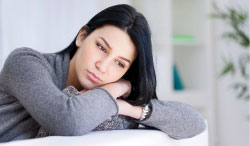If you find it a struggle to shake off your New Year blues there could be a reason. An increasing amount of people are displaying symptoms of a relatively unheard of disorder that occurs during the winter months.
 The New Year can be tough for many of us. It marks the start of another 12-month cycle; the thought of which can be a hard pill to swallow. The days seem longer thanks to dark afternoons, we’re all carrying a little bit too much festive weight and the next holiday seems light-years away. So it’s understandable that many people don’t consider themselves happy during January. Often being unhappy is misconstrued as feeling sad, lonely and possibly even suicidal, but what about just feeling ‘blah’ and unmoved by the world?
The New Year can be tough for many of us. It marks the start of another 12-month cycle; the thought of which can be a hard pill to swallow. The days seem longer thanks to dark afternoons, we’re all carrying a little bit too much festive weight and the next holiday seems light-years away. So it’s understandable that many people don’t consider themselves happy during January. Often being unhappy is misconstrued as feeling sad, lonely and possibly even suicidal, but what about just feeling ‘blah’ and unmoved by the world?
However, there is a large amount of evidence from psychologists about a disorder that explains this gloomy mood that occurs during the winter months, called Seasonal Affective Disorder (aptly abbreviated to SAD). The experts believe this illness to be spurred primarily by insufficient exposure to sunlight, which has been linked to carbohydrate craving, weight gain and sleep disturbance – sound familiar?
The cause
Our expert: Dr Waiel Alani, consultant psychiatrist at Bahrain Specialist Hospital. SAD is a type of depression that affects a person during the same season each year. There is no definite cause for winter blues but SAD is a possible theory. “It is a type of depression that affects a person during the same season each year,” says the doctor. “If you feel low in the winter, but much better in spring and summer then you should get tested for the illness.”
Experts suggested a possible theory depends on a lack of sunlight. “Sunlight determines the amount of serotonin the body produces and it is the brain chemical that regulates the body’s circadian rhythm,” outlines Dr Waiel. “On the other hand, the brain often gets out of sync with the sun because of winter’s shortened days. There is more of the melatonin hormone that is usually secreted at night. This can affect the sleep/wake cycle and other rhythms that make people unhappy, tired and in low spirits.”
 Who does it affect?
Who does it affect?
Those who live in areas where the winter days are short are more prone to displaying signs of SAD; however, there are many other types of people who are susceptible to it.
“Studies have shown that the disorder occurs in females more than males and in those aged between 15 and 55 years,” explains Dr Waiel. “Furthermore, if a family member has been diagnosed with SAD, your chances of having it are increased.”
The symptoms
Our expert: Dr Mona El Gezery, consultant psychiatrist at American Mission Hospital. Most people get unhappy moments due to circumstantial reasons, or sad events, yet they cope with their sadness and eventually snap out of it. “Depression on the other hand is an illness with specific symptoms and signs that break the patient’s will, needing treatment in most cases,” explains Dr Mona. There are a number of identifiable symptoms that present themselves when a person is suffering from SAD.
“These may include a consistent difficulty to wake up in the morning, morning sickness and a tendency to oversleep,” the doctor lists. “People with SAD also tend to crave carbohydrates, which can lead to significant weight gain. Other symptoms include a lack of energy, difficulty concentrating on or completing tasks and withdrawal from friends, family and social activities. Some patients also experience a decreased sex drive.” The personality of a patient with the disorder will also alter and he/she may become irritated very quickly.
The treatment
 Our expert: Dr Michael Terman, director of the Center for Light Treatment and Biological Rhythms at New York-Presbyterian Hospital.Research shows that the first steps to overcoming SAD should be lifestyle changes and self-help treatments.
Our expert: Dr Michael Terman, director of the Center for Light Treatment and Biological Rhythms at New York-Presbyterian Hospital.Research shows that the first steps to overcoming SAD should be lifestyle changes and self-help treatments.
“Make sure you get more sun and light exposure even inside the home,” says Dr Michael. “Also it’s recommended that you are more social and take up outdoor activities – perhaps get a dog so that you walk it for an hour each day. Your diet should be altered; eat foods containing Vitamin B1, B2, B12 and Omega 3 in addition to folic acid.”
Drug treatments
If more subtle amendments don’t work, those with SAD may be advised to begin a course of medication. Antidepressant medications are generally suggested which have been proven to show benefits in some patients. However, there is another emerging type of medicine that has been approved. “In 2006, Wellbutrin XL became the first drug approved specifically for SAD in the US,” Dr Michael says.
“The effectiveness of Wellbutrin XL for the prevention of SAD episodes was established in three double-blind, placebo-controlled trials in adults with a history of major depressive disorder in fall and winter. In these trials, the percentage of patients who were depression-free at the end of treatment was significantly higher for those on Wellbutrin XL than for those on placebo.”
Light therapy
Bright light therapy is another treatment path that some doctors opt to take with SAD patients. “This method has been investigated for over two decades in well over a thousand patients,” explains Dr Michael. “A treatment regimen for bright light includes a level of 10,000 lux for 30 minutes daily upon awakening. The apparatus uses a bank of high-output fluorescent bulbs that are shielded behind a smooth diffusing filter that eliminates all UV radiation as a safety measure. The lights tilt towards the eyes from above, minimising unpleasant glare. SAD patients who used the light box upon awakening have been found to do significantly better than those who use it in the evening.”
Beat the New Year blues
It isn’t uncommon for a lot of people to feel low during January after the festivities of the holiday season and this doesn’t mean that you have SAD or are clinically depressed. Instead you may feel less energetic, less productive, have less control over your appetite and require more sleep. If this is the case, you probably don’t need to pay your doctor a visit, but instead help yourself with simple tasks that will keep you invigorated.
l Keep yourself busy: don’t mope around. Starting a new hobby is a great way to meet new people.
l Get fresh air: brave the cold and go outside whenever possible to let your skin breathe.
l Eat correctly: your diet affects your mood so ensure you eat well-balanced meals.
l Don’t overdo alone time: spend time with other people for fresh conversation and inspiration.
l Laugh and have fun: never say no to anything and enjoy yourself! Life is too short to worry too much.





































